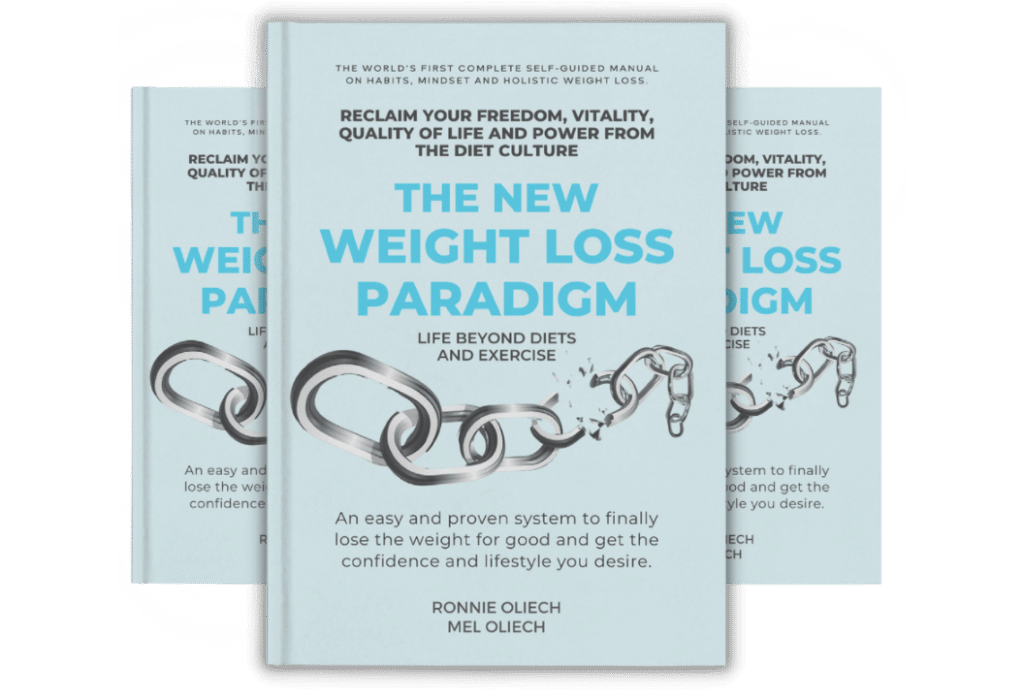How many diets have you been on?
How many have helped you lose weight and keep it off?
If you’re like most people, you’re probably feeling frustrated by the lack of results, and wondering what’s wrong with you, that you can’t lose weight. After all, these diets are designed to help you lose the excess kilos, right?
But there’s a devastating truth that the diet industry doesn’t tell you. Are you ready for it?
DIETS DON’T WORK.
That’s right. Many scientific studies have proven that dieting doesn’t work in the long-term. The majority of people — as many as 98% — end up gaining all the weight they lost (and more) within 5 years.
The only thing that diets are successful in, is helping you lose your health, happiness, time and money.
Let us explain.
Diets compromise your physical health
Diets promote themselves as something good for your health, but in reality, they do far more damage to your overall health and wellbeing, than they do good.
Lowers your metabolism
One of the worst things about diets is they compromise your metabolism. Your metabolism is basically the many complex chemical processes that occur in order to keep your body functioning normally. The number of calories (energy) your body burns at rest to do all these things is called your Basal Metabolic Rate.
Regularly eating too few calories causes your metabolism to slow down. Several studies show that low-calorie diets can reduce your metabolism by as much as 23%. What’s more, this lower metabolism persists long after you come off your diet. And with a slower metabolism, it becomes harder to lose weight. When you stop your diet, and go back to your old eating habits, you’ll not only be eating more calories than you were on the diet, but you’ll be burning fewer calories due to your lower metabolism. This helps explain why the vast majority of people who go on a diet, gain it all back, and more, when they come off it.
Causes binges
Did you know that diets cause binges? Dieters often swing between two sets of behaviours — restriction and bingeing. And the balance between the two is like a clock pendulum — the harder you swing to one side, the harder you’ll swing back to the other. When you restrict your food, your body recognises this ‘starvation’ and kicks in physiological processes to stop you from starving to death. This means your appetite increases, along with your cravings for certain foods. This eventually leads to binge eating, which causes you to restrict your food in order to make up for the binge, which leads to more bingeing. And on and on the cycle goes. If you’ve ever dieted and suffered from binge eating, please understand that this is not a result of ‘lack of willpower’, but your body’s natural reaction to restricting your food too much.
Lead to digestive problems
When you embark on a diet, you’ll probably have a list of ‘bad’ foods, and a list of ‘good’ foods. The ‘bad’ foods usually include foods high in fat, salt, sugar, but may also include dairy and carbohydrates, while the ‘good’ foods usually include lots of fruits, vegetables and lean protein. Other recommendations may also include eating whole grains over ‘processed grains’ (i.e. eating brown rice instead of white, wholegrain pasta instead of white pasta, etc.). However, changing your diet drastically and eating too much fibre too quickly can wreak havoc on your digestive system. Because diets are very prescriptive (i.e. driven by rules and regulations), you’ll feel you need to follow it to the letter, even if the food you’re eating doesn’t agree with you. What often happens is that you end up with gut and digestive problems, because you’re eating foods that don’t work for you, or you eat too much of one particular food that causes problems. Cutting out complete food groups can also lead to nutrient deficiency, which may also interfere with normal digestive processes.
Causes fatigue
The restrictive nature of diets also causes you to feel tired and lethargic, because you simply don’t eat enough or you don’t eat foods that are nutritious. Skimping on calories in order to lose weight only causes your body to run on empty. It’s a bit like only half-filling your car’s fuel tank, but expecting it to go as far as it would on a full tank of fuel.
Impacts your hormones
Lack of calories through dieting also impacts your hormones. In short, hormones are chemical messengers and are vital for your body to function at optimal levels. Hormones help regulate hunger, mood, eating behaviours, satiation (how full you feel), stress, sleep, reproductive health and energy levels. However, excessive dieting can influence your hormones and put these out of balance, leading to a number of health issues,.
Compromises your immune system
Have you ever noticed that you often get sick when you’re dieting? That’s because diets often starve your body of much-needed nutrients, leading to a compromised immune system. Any eating plan that weakens your immune system is one you should avoid following.
Diets damage your mental health
The darker side of diets is that they seriously mess with your mental health. Even though it’s been scientifically proven that diets don’t work for long-term weight loss, the diet industry makes you feel that you’re a failure if you can’t lose weight. Of course, this is designed to keep you coming back for more — the next fad, or cleanse, or empty-promise they make you. But most dieters don’t realise this, and instead blame themselves for their lack of results. This leads to:
Lack of confidence and self-belief
When you continually work at something and still fail, you’ll lose confidence self-belief. You’ll blame yourself for your failures and think that there’s something wrong with you. This erosion of confidence leeches into the rest of your life and will eventually affect your relationships, business or career, and the way you raise your kids.
Low self-esteem and self-worth
Diets are great at making you feel bad about yourself. They promise to help you lose weight and feel confident, but in reality, they just leave you feeling worse about yourself. This low self-esteem leads to behaviours such as people-pleasing, and not looking after yourself, which only makes your weight loss journey even harder. And with every failed diet, your self-esteem takes another dive.
The desire to be perfect
Diets are designed to be followed by the letter, which promotes negative, perfectionist behaviours. These cause you to relentlessly strive for extremely high standards, even if they’re impossible to achieve or come at a great cost to yourself. You end up judging your self-worth based on your ability to achieve such high standards, and because these standards are unrealistic, you beat yourself up for not being able to attain them. In the quest for perfection, you’ll become obsessed with counting calories, and measuring food, or even taking your own food to social occasions. In your quest to be perfect, you’ll strive to work harder, exercise more, and diet harder, so you can lose weight. But because this approach is unrealistic, it only perpetuates the cycle of low-self-esteem, low self-worth and the need to be perfect.
Cause you to compare
The focus on diets is to lose weight and usually as quickly as possible. This often leads to dieters comparing themselves with other people to see if they are ‘doing the diet correctly’ or to see if there is a better diet they could go on, that will lead to better weight loss in a shorter period of time. But comparing yourself to others will actually slow your weight loss, because you won’t be focusing on the actions you need to take to succeed.
Diets make you unhappy
As you can see above, diets take a massive toll on your mental health, and can leave you feeling very lost, confused, overwhelmed and feeling terrible about yourself. But they also make you unhappy in other ways.
They isolate you from your family and friends
When you’re on a diet, you feel as if you can’t eat food that the rest of your family and friends are eating. This may mean you eat your special ‘diet’ food instead of the family meal, or when you socialise with your friends, you avoid eating all together and then end up bingeing when you get home. In some cases, you may even avoid social events, because it’s just too hard to stick to your diet.
Finding value in the scales or how clothing fits
Diets focus on shrinking your body, so it’s natural for you to expect that this will show up as a smaller number on the scale or smaller clothes size. When you focus on the scale or the size of your dress, you’ll end up measuring your value according to what the scale says or what your clothing tag size is. If the scales go up – even by 100g — or you need a larger size in a different brand of clothing, your confidence plummets and you end up having a bad day, or even a bad week.
Negative body image
Dieting is designed to ‘fix your body’ (i.e. lose the fat and look ‘great’). But this approach causes you to fixate on the things you don’t like about your body, which leads to a negative body image. Instead of appreciating your body for the things it can do, you focus on the fat on your arms, or the roll around your middle. Instead of empowering you, dieting causes you to feel ashamed and self-conscious of the body you have.
Diets waste your time
Take some time to think about how many diets you have been on? Now how much time did you spend following them? You might have spent time shopping for unusual ingredients and then coming home and spending hours preparing all your ‘diet-friendly meals’. Or maybe you spent hours at weekly weight-loss meetings.
Now how much time did you spend thinking about your diet? Or losing weight? Or worrying about your weight? Or feeling self-conscious about your body?
How many years have diets stolen from you?
The truth is that diets steal years of your life. They pervade every aspect of your life, stealing time and focus that you could have spent with your family, your friends, traveling, starting a business, or even pursuing a new hobby.
And the only thing you have to show for this time spent on diets, is a body and mind that has been broken by the endless dieting cycle.
DIETS COST YOU MONEY
The painful truth is that diets cost you money as well. Along with the diet programs and meal plans, you’re also likely to be spending extra money on gym memberships, special recipe books, magazines, online weight loss subscriptions, supplements, or pills and potions that don’t work at all.
In fact, research from the UK has found that during their working life (18-60 years), the average person spends a staggering $62,500 (£31,500) on dieting — something that has been scientifically proven NOT to lead to long-term weight loss.
Crazy, huh!
Imagine what else you could be spending that money on.
Even the fitness industry suffers from diets
If you think the fitness industry is immune to the diet culture, think again.
Many PTs are also caught in the diet trap. Often insecure about their own bodies, they believe that doing a body-building comp is the only way to get their body in shape in order to attract clients. So they put themselves through a rigorous process in order to ‘shred’, becoming slaves to the diet culture themselves. Of course, they believe that getting a result is great because now they are a walking advertisement for their business. But the pressure to maintain their body, and keep attracting clients is so immense, that it takes up every ounce of energy they have.
When the clients come through the door, many PTs teach them the same thing, because that’s all they know. They often get them to follow unrealistic eating plans, which involve limiting food, cutting calories and eliminating food groups, while devising exercise plans that even a very fit individual would have trouble sticking with. And to ensure that their client loses weight, they put an immense amount of pressure on their clients to stick to the plan in order to succeed (because their success means another marketing opportunity).
What usually happens is that their clients burn out and of course, fail to achieve permanent weight loss. So they give up and leave. All of a sudden, the PT has to fill the vacant spots, and so they devise a 6-week or a 12-week challenge, promising amazing results in a short time. People who are desperate to lose weight buy into the false promises, and the cycle starts again.
Meanwhile, the PT is working hard behind the scenes, exercising like a demon and dieting relentlessly to keep their body, while worrying about how to get the next intake of clients, because they know that the current group won’t be hanging around long-term either.
In short, it’s a culture that sees PTs forever scrambling for clients and money, which eventually leads them to burnout, lose faith in their careers, and quit the industry because it’s all too hard.
But there is a better way!
What’s the solution?
The bottom line is that you don’t need to diet to lose weight. Dieting only causes weight gain and more pain.
The secret to permanent weight loss is addressing the core reasons why you became overweight in the first place — your habits. Because until you understand why you do what you do, you’ll never get out of the diet cycle that is stealing your life away. Instead, you’ll keep defaulting back to what you know, destined to spend the rest of your life (and a good chunk of money) going around in circles, becoming more frustrated, more depressed, and more ashamed, while slowly gaining weight over the long-term.
At Imani Tribe Transformations we help people just like you to break free of the diet culture that has been eroding their self-esteem and self-worth for years. Through our structured approach, and accountability, we provide them with the skills, tools and knowledge they need to finally be free around food and ditch the diets forever.


















